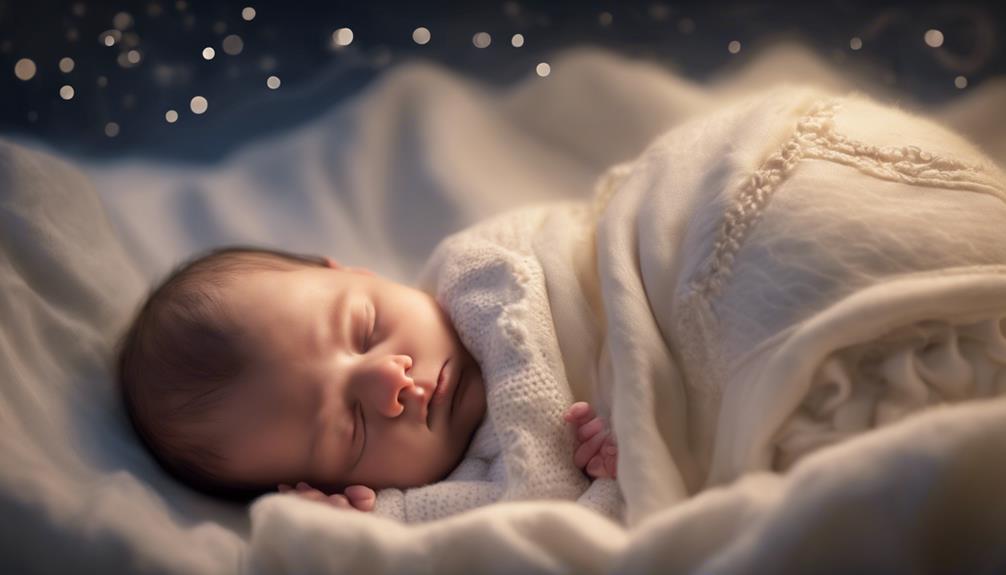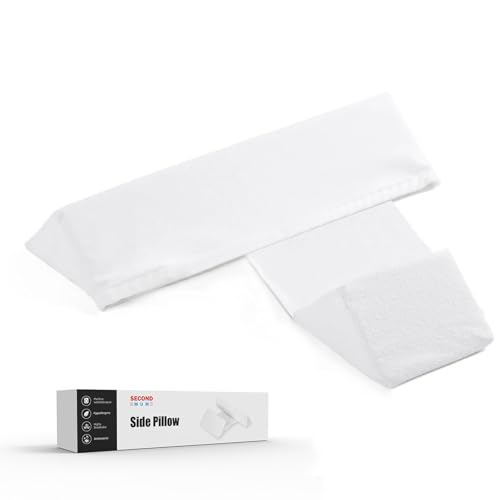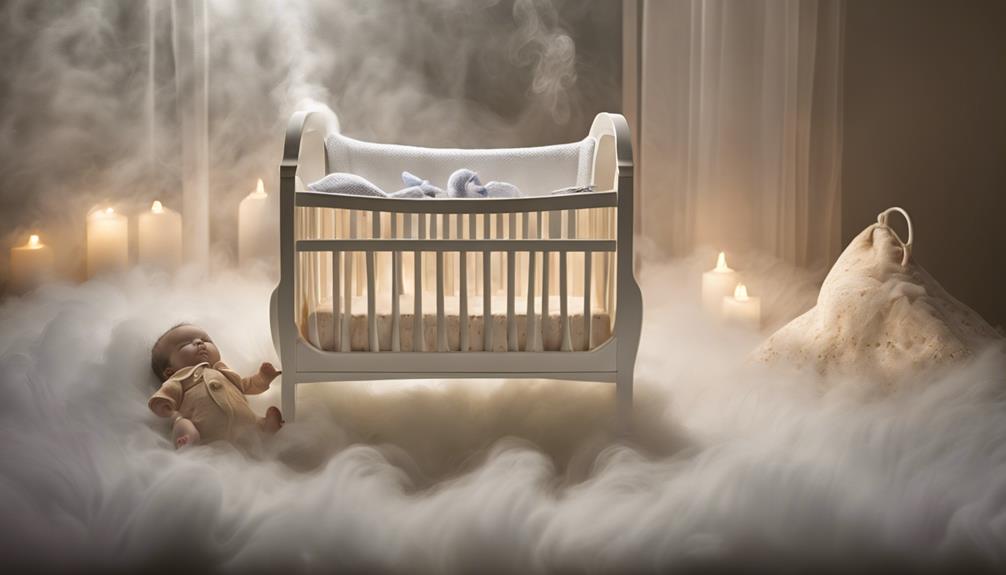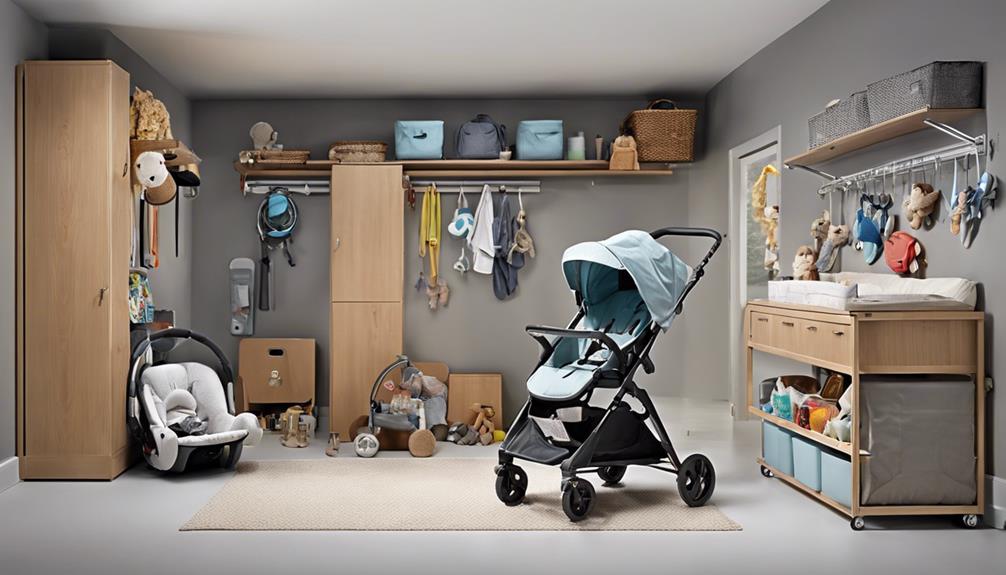As parents, we often find ourselves concerned about our newborns' well-being, especially when it comes to their sleep. Did you know that wheezing affects up to 30% of infants in their first year of life?
Understanding how to soothe newborn wheezing during sleep is vital for ensuring both the baby's comfort and the parent's peace of mind.
By exploring effective techniques and strategies to ease wheezing episodes, we can create a more restful environment for our little ones.
Key Takeaways
- Recognize common causes of newborn wheezing and distinguish normal sounds from signs of airway obstruction.
- Implement soothing techniques like gentle suctioning and elevating the baby's head to alleviate symptoms.
- Create a sleep-friendly environment with hypoallergenic bedding and pillows, and proper ventilation.
- Seek medical advice promptly for persistent wheezing to address underlying respiratory issues.

Frida Baby 3-in-1 Cool Mist Humidifier for Large Rooms, Top Fill Humidifier for Bedroom, Allergy Relief, 60 Hour Runtime + Nightlight, Auto Shut-Off, Quiet, Carry Handle, Essential Oil Diffuser
ULTRASONIC COOL MIST HUMIDIFIER: Our baby humidifier converts water into a refreshing mist that runs up to 60…
As an affiliate, we earn on qualifying purchases.
As an affiliate, we earn on qualifying purchases.
Understanding Newborn Wheezing
Understanding Newborn Wheezing involves recognizing common causes and distinguishing between normal respiratory sounds and signs of potential airway obstruction. It's important for parents to be aware that newborn wheezing, especially during sleep, can be triggered by factors such as mucus accumulation, respiratory infections, or conditions resembling asthma.
When babies sleep, any unusual high-pitched whistling sounds should be carefully monitored, as they may signal narrowed airways and an increased risk of SIDS. The American Academy of Pediatrics recommends placing the baby down to sleep on their back to reduce the risk of SIDS. If wheezing is noticed, gently suctioning the airways, providing humidified air, or elevating the baby's head during sleep can sometimes alleviate symptoms.
However, persistent wheezing or the presence of other concerning symptoms should prompt consultation with a healthcare provider to assure appropriate management and monitoring. Remember, when it comes to a baby's health, vigilance and prompt action are key.

GROWNSY Nasal Aspirator for Baby, Electric Baby Nose Sucker with Larger Suction Chamber and More Powerful Suction, Automatic Nose Cleaner with Music and Light Soothing Function
EFFORTLESS CLEARANCE: GROWNSY's Top-Rated Electric Nasal Aspirator for Babies features 3 adjustable suction levels for customized comfort, features…
As an affiliate, we earn on qualifying purchases.
As an affiliate, we earn on qualifying purchases.
Identifying Causes of Wheezing

During sleep, newborn wheezing can stem from various causes such as respiratory infections, allergies, asthma, reflux, or congenital issues like tracheomalacia. Identifying the underlying reason for your baby's wheezing is important for ensuring appropriate treatment.
Here are some key points to bear in mind:
- Respiratory Infections: Babies are at a higher risk of developing respiratory infections like bronchiolitis, which can lead to wheezing. Keeping track of any accompanying symptoms such as fever or difficulty breathing is essential in determining if an infection is the cause.
- Allergies and Asthma: Allergies or asthma can also trigger wheezing episodes in newborns. Monitoring your baby's environment and noting any patterns in wheezing episodes can help identify potential allergens.
- Reflux and Congenital Issues: Gastroesophageal reflux or congenital conditions like tracheomalacia can contribute to wheezing during sleep. Seeking medical advice if your baby frequently sleeps on their stomach and experiences wheezing is important, especially in the early months of age.

ZPECC Toddler Down Alternative Comforter, 39×47 Hypoallergenic Baby Blanket Quilt, Soft Breathable Lightweight All Season Kids Duvet Insert for Crib Stroller Cot Daycare, White
PACKAGE INCLUDE: Only 1 Toddler comforter(39 x 47 inches), No pillows or accessories included
As an affiliate, we earn on qualifying purchases.
As an affiliate, we earn on qualifying purchases.
Implementing Soothing Techniques

To effectively alleviate newborn wheezing during sleep, consider implementing targeted soothing techniques that can promote better breathing and comfort for your baby. When putting your baby to sleep, gently rock them back and forth in your arms to help calm a fussy baby and encourage relaxation.
Utilize a cool mist humidifier in the room to add moisture to the air, which can ease wheezing and make breathing more comfortable. Make sure to using blankets or toys that could pose a suffocation risk, reducing the chances of sudden infant death syndrome.
Elevate your baby's head slightly by placing a rolled towel under the crib mattress to aid in easier breathing. Before bedtime, use a saline nasal spray or drops to clear your baby's nasal passages, facilitating better airflow.
Guarantee the sleeping environment is clean and free of allergens to minimize irritants that may exacerbate wheezing. If wheezing persists despite these soothing techniques, consult with a pediatrician for further evaluation and guidance.

Baby Side Sleeper Wedge Adjustable Soft and Breathable Pillow Supports Newborn Front and Back
PERFECT SIDE PILLOW – Comfortably and safely. Don't take a chance on getting a cheap, chemical smelling wedge…
As an affiliate, we earn on qualifying purchases.
As an affiliate, we earn on qualifying purchases.
Creating a Sleep-Friendly Environment

Maintaining a cool and well-ventilated room is essential in reducing triggers for wheezing during a newborn's sleep. Proper environmental conditions play a vital role in ensuring a peaceful and healthy sleep for young children.
When creating a sleep-friendly environment for your baby, consider the following:
- Hypoallergenic Bedding and Pillows: Opt for hypoallergenic materials to minimize potential allergens that can worsen wheezing in sensitive infants.
- Elevate the Head of the Crib: By slightly elevating the head of the baby's crib, you can help improve breathing and reduce the likelihood of wheezing episodes during sleep.
- Regular Cleaning and Dusting: Clean and dust the baby's sleep environment frequently to minimize irritants and allergens that could contribute to wheezing.
Seeking Medical Advice

Seeking prompt medical advice is essential when your little one is experiencing wheezing during sleep. If you notice your baby wheezing, it's vital to consult with a healthcare provider promptly. While there's actually a range of reasons why newborns might wheeze during sleep, including common colds or respiratory infections, it's important to have a professional evaluate the situation. The American Academy of Pediatrics (AAP) recommends that any unusual breathing patterns, including wheezing, should be assessed by a healthcare provider.
When you seek medical advice, a healthcare professional can determine the severity of the wheezing and recommend appropriate treatment options. Sometimes, wheezing in newborns can indicate underlying respiratory issues that require intervention. By consulting with a healthcare provider, you can receive reassurance and guidance on how to manage your baby's wheezing effectively. Remember, timely medical consultation can address any concerns and ensure your baby passes through this phase with proper care and attention.
Frequently Asked Questions
How Can I Help My Baby With Wheezing?
We can assist your baby with wheezing by ensuring proper sleep positioning, using a cool-mist humidifier, maintaining an allergen-free sleep environment, and seeking medical advice if symptoms persist. Avoiding irritants like smoke is vital for preventing worsening wheezing.
Is It Normal for Newborns to Wheeze While Sleeping?
Yes, it's normal for newborns to wheeze while sleeping due to their small airways and mucus. If accompanied by worrisome symptoms like difficulty breathing, medical evaluation is advised. Keeping the sleep environment clean and using a humidifier can help.
What Are the 5 S's Method for Soothing Babies?
When soothing babies, we swear by the 5 S's: swaddle, side-stomach position, shush, swing, and suck. These techniques promote security, calmness, and better sleep for newborns. Incorporating these methods can work wonders for soothing little ones.
How Do I Get My Newborn to Sleep Through Noise?
We use white noise machines or fans for consistent background noise. Establish a bedtime routine with calming activities. Swaddle for security. Experiment with different sleeping arrangements. Consider earplugs. These methods help our newborn sleep through noise and create a peaceful environment for everyone.
Conclusion
To sum up, by understanding the causes of newborn wheezing and implementing soothing techniques, parents can create a peaceful sleep environment for their little ones.
Remember, just like a symphony conductor, you have the power to orchestrate a harmonious night's rest for your baby. Trust in your instincts, follow the guide's advice, and watch as your newborn drifts off into dreamland with ease.
Soothe, comfort, and enjoy these precious moments of parenthood.









